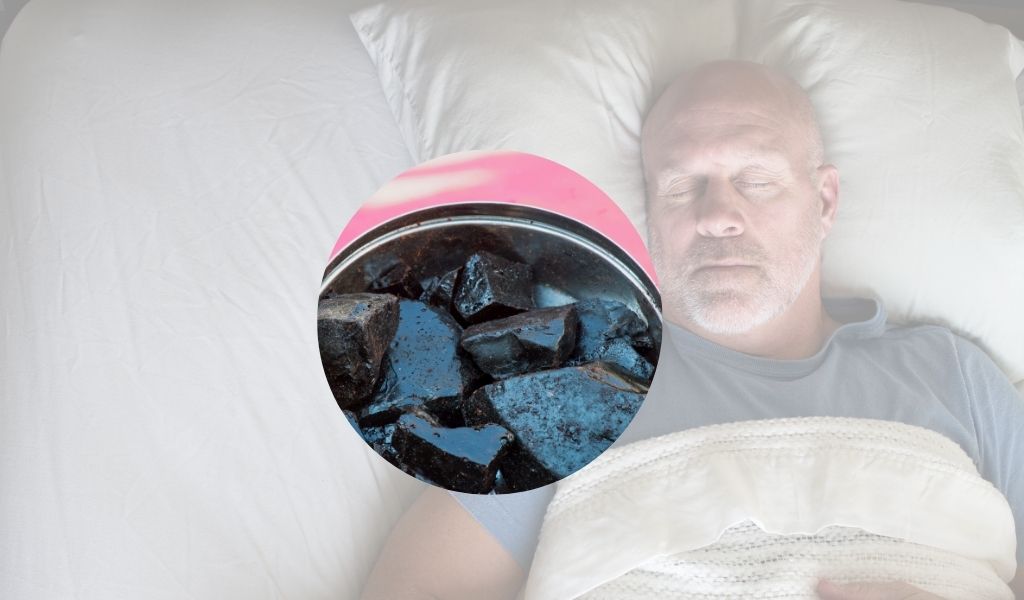
Can I Take Shilajit Before Bed? Best Time to Take Shilajit
Can I take Shilajit before bed? It's a frequently asked question. If you've ever struggled with getting a good night's sleep, you may have heard about the potential benefits of taking shilajit before bed. But is this natural supplement safe and effective for promoting better sleep? In this article, we'll explore the topic in more detail and provide all the information you need to make an informed decision.
Before exploring further, please read the disclaimer located at the end of this webpage.
Can I Take Shilajit Before Bed?
Due to its energizing properties, taking Shilajit in the evening may lead to difficulty in falling asleep. Therefore, consider using Shilajit in the morning for optimal results. During this time, our bodies have a robust digestive process, which enables the easy absorption of nutrients from Shilajit.
Shilajit is often considered an energy source due to its complex composition of minerals, fulvic acid, humic acid, and other organic compounds. While it is not a direct source of calories like carbohydrates or fats, the components found in shilajit may support energy production at the cellular level.
For this reason, if the body is provided with abundant energy, it will lead to difficulty sleeping. After considering the information above, let's explore the pros and cons of taking Shilajit before bed.
Read more: Can Shilajit Be Taken With Coffee? 3 Ways To Take Shilajit
Pros and Cons of Taking Shilajit Before Bed
Pros of Taking Shilajit Before Bed
Adaptogenic Properties: Shilajit is classified as an adaptogen, aiding the body in adapting to stressors. Taking it before bedtime promotes relaxation, reduces stress, and improves sleep quality.
Mineral Content: Shilajit is abundant in minerals, including magnesium. Magnesium is known for its relaxing effects and potential contribution to better sleep quality.
Fulvic Acid Benefits: Fulvic acid, a significant component of shilajit, possesses antioxidant properties and potential benefits for overall health. These properties may enhance general well-being, including sleep.
Several users on Amazon who have taken supplements containing Shilajit have reported noticeable improvements in their bodies.*
One user, Flavio, who recently started using the supplement, shared: “I was looking for something to improve my energy and focus on a daily basis, as I work long hours and sometimes feel that mental fatigue that gets in the way of everything. After a few days of taking it regularly, I noticed that my energy levels increased significantly, without that 'peak and fall' feeling that some stimulants cause.”*
Cons of Taking Shilajit Before Bed
Stimulating Effects: Shilajit is also associated with providing an energy boost. However, consuming it before bed may increase alertness or energy levels for some individuals, potentially hindering sleep onset.
Individual Sensitivity: People may respond differently to shilajit. While some individuals may not experience stimulating effects, others may find it disruptive to their sleep.
How Does Shilajit Impact Your Sleep?
So, the best time to take Shilajit is before bed 30 minutes, but how does Shilajit impact your sleep? Let's follow the analysis below.
Modulating Circadian Patterns
Shilajit supports better sleep and regulates the body's biological clock by improving blood circulation and enhancing oxygen transport to tissues. [1]
Moreover, Shilajit is rich in over 84 minerals, with fulvic acid as its main component. Fulvic acid facilitates the transportation of these minerals into cells, maintaining and restoring their optimal function, thus limiting breakdown and cell death. [1]
Shilajit also boosts metabolism, promotes energy production, and balances catabolism and anabolism. It aids in efficient absorption and detoxification while stimulating the immune system for overall health and improved sleep.[1]
In summary, Shilajit plays a crucial role in regulating the circadian rhythm, ensuring alignment with the natural sleep-wake cycle, thereby enhancing sleep quality.
Alleviating Stress
Shilajit acts as an anti-stress agent [1]. Therefore, it might indirectly contribute to better sleep by helping the body manage stress more effectively. Shilajit has calming and relaxing effects. This could help individuals unwind before bedtime, promoting a more restful sleep.
How To Use Shilajit Before Bed? Are There Any Caution?
The recommended dose of Shilajit to maintain optimal health is 300-500 mg/day. Shilajit powder with milk twice daily will ensure optimal blood levels and the effectiveness. [1]
As a side note, as mentioned at the beginning of the article, it should be avoided in the evening because if you are sensitive to supplements that affect your energy or experience any stimulating effects from shilajit. You can avoid taking it too close to bedtime to avoid affecting your sleep.
Therefore, taking shilajit in the morning or early afternoon is recommended to benefit from increased energy levels throughout the day.
Learn more: 10 Foods You Should Avoid Consuming With Shilajit
Timing for Taking Shilajit
Morning Or Early Afternoon
Therefore, taking shilajit in the morning or early afternoon is recommended to benefit from increased energy levels throughout the day.
When Tired
If your lack of energy negatively impacts your quality of life, now might be the ideal time for you to consider utilizing Shilajit as directed.
Evening
It's also an intriguing discovery that consuming Shilajit at night can boost energy if your job needs you to stay late.

Conclusion
Shilajit before bed can improve sleep due to its adaptogenic properties, mineral content, and fulvic acid. However, its stimulating effects may disrupt sleep, so timing of consumption is important. When taken correctly, shilajit can help regulate circadian rhythms, reduce stress, and enhance sleep patterns. Tailor Shilajit's intake based on personal response and lifestyle, and choose a high-quality Shilajit product from a reputable brand, as well as consult a healthcare provider before starting any supplement routine.
References
- [1] Meena, Harsahay, et al. "Shilajit: A Panacea for High-Altitude Problems." International Journal of Ayurveda Research, vol. 1, no. 1, 2010, p. 37, https://doi.org/10.4103/0974-7788.59942.
Testimonial Disclaimer
*The testimonials presented on this website are provided by individuals based on their personal experiences with our products. These testimonials represent individual opinions and experiences, which may not be typical or applicable to all users of our products. Results may vary depending on a variety of factors, including individual health, lifestyle, and adherence to product usage instructions.Author

Product Disclaimer
Including an ingredient or study does not evaluate, endorse, or recommend any Vinatura product or any third-party product. Some ingredients discussed may not be used in any Vinatura product.
The content of the articles has not been evaluated by the Food and Drug Administration (FDA) and is not intended to promote or endorse any specific product. Any products sold on this website are not intended to diagnose, treat, cure, or prevent any disease.
Opinions and Endorsements
Any claims, statements, or opinions expressed in the articles are those of the author(s) and do not necessarily reflect the views or opinions of the manufacturers of the dietary supplement products. The products sold on this website are separate from the content of the articles and are not directly endorsed or associated with the information presented here.
Liability Disclaimer
The author(s) of the articles, website, and manufacturers of the dietary supplement products do not assume any liability for any potential consequences arising from the use of the information provided in the articles. Ingredient effects, dosages, and safety vary by individual, formulation, and context; some ingredients interact with medications or may be unsuitable during pregnancy or lactation. It is recommended that individuals consult with a qualified healthcare professional before making any dietary or lifestyle changes, including the use of dietary supplements.
Product Usage
Please refer to the product labels and packaging for specific usage instructions and guidelines for the dietary supplement products sold on this website.
Customer Support
For any concerns or questions regarding the dietary supplement products, please contact our customer support team, who will be more than happy to assist you.





Leave a Comment
Be the first to comment.
What do you think?